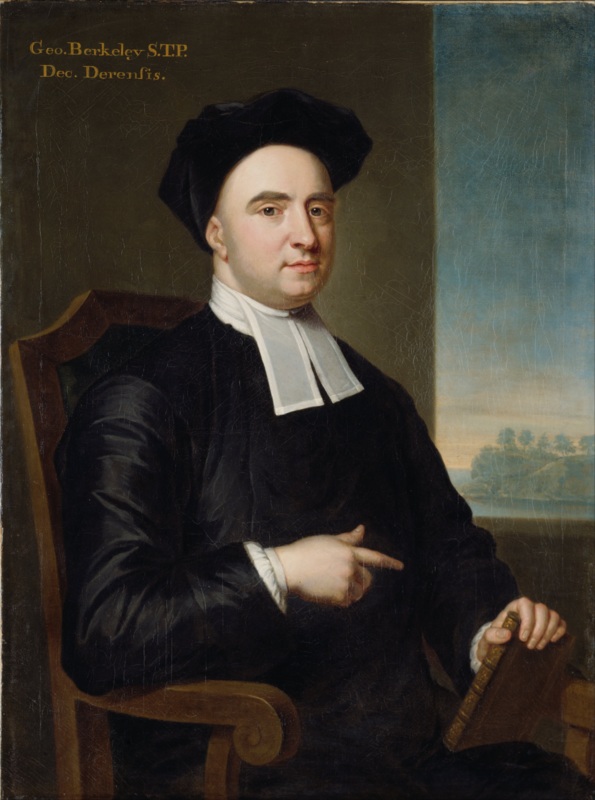|
第二卷 論概念(Book II: Of Ideas)有三十三章; 約翰·洛克認為人的概念出於兩個來源﹕﹙一﹚感覺作用;﹙二﹚對自己的心靈活動的知覺,這可以稱作“內感”。 第六、七章討論” 心靈活動的知覺”---- 有許多值得注意的觀點,也有重大的論述盲點!!
第六章 論簡單的反省概念(Chapter VI: Of Simple Ideas of Reflection)
- 簡單的(反省)概念是心靈各種關於其它概念的活動(Simple ideas are the operations of mind about its other ideas.)
- 我們的知覺概念,和意願概念,是來之於反省(The idea of perception, and idea of willing, we have from reflection.) 思想的能力就是叫做理解;決心的能力就是叫做意志;這兩種心理能力或力量可稱為天賦。(The power of thinking is called the Understanding, and the power of volition is called the Will ; and these two powers or abilities in the mind are denominated faculties.)
第七章 論來自感覺和反省的簡單概念(Chapter VII: Of Simple Ideas of both Sensation and Reflection)
- 快樂和痛苦的概念(Ideas of pleasure and pain)幾乎同一切感覺和反省的概念分不開。 感官接收到外面的刺激,內在心靈的活動所引發的任何思想,幾乎沒有一種不產生快樂或痛苦的概念。
- 我們行為的動機(As motives of our actions)---- 我們無限智慧的創造者, 已經給了我們身體各個部分的能力,使我們肢體能隨心所意的運動或休息;……也已經給了我們心靈的能力,在不同的情況下,由心靈中概念,進行選擇,心靈將思考,以謹慎思慮及注意追蹤審查這個題目或那個題目,並激勵我們有能力思考及行動的這些措施----已經滿足於結合各種思想,和不同感官喜悅的感覺。(The infinite wise Author of our being, having given us the power over several parts of our bodies, to move or keep them at rest as we think fit ; …… having also given a power to our minds, in several instances, to choose, amongst its ideas, which it will think on, and to pursue the inquiry of this or that subject with consideration and attention, to excite us to these actions of thinking and motion that we are capable of, – has been pleased to join to several thoughts, and several sensations a perception of delight.)
- 結束和疼痛的應用(An end and use of pain)---- 痛苦也如同快樂般的效能和功用,都能促使我們從事工作,我們隨時可以運用自己的各種天賦來追求快樂,而且亦隨時可以運用它們來避免痛苦: 唯一值得我們留意的,痛苦的產生亦往往是產生快樂的那些客體和概念。(Pain has the same efficacy and use to set us on work that pleasure has, we being as ready to employ our faculties to avoid that, as to pursue this : only this is worth our consideration, that pain is often produced by the same objects and ideas that produce pleasure in us.) 洛克說,上帝在各種思想和感覺上附加一種快樂或痛苦的知覺,這樣各種天賦才不至於無用或沒有方向----類似植物”向陽性”(Heliotropism)的指引。
- 存在和整體的概念是另外兩個概念由外在一切客體的啟發而成為內在一切概念的理解。(Ideas of existence and unity are two other ideas that are suggested to the understanding by every object without, and every idea within.) 當概念存在於我們的心中,我們認為外界事物是真實的存在;-就是存在,他們存在,或有實體。 這就是說我們認為是單一事物,不論是真正存在或是概念,它都可以啟發而理解成為整體的概念。(When ideas are in our minds, we consider them as being actually there, as well as we consider things to be actually without us ; – which is, that they exist, or have existence. And whatever we can consider as one thing, whether a real being or idea, suggests to the understanding the idea of unity.)
- 能力概念(Idea of power)---- 能力也是另一個我們由感覺和反省得來的簡單概念。因為,向內觀察我們自己,我們行動而且能思考,並且也可以任意運用自己原來靜止的個部分的肢體;而且,每時每刻我們意念出現時,自然界的物體能互相創作出各種的結果,-我們便從這兩條途徑(行動、思考)得到能力的概念。(Power also is another of those simple ideas which we receive from sensation and reflection. For, observing in ourselves that we do and can think, and that we can at pleasure move several parts of our bodies which were at rest ; the effects, also, that natural bodies are able to produce in one another, occurring every moment to our senses, – we both these ways get the idea of power.)
- 接續的概念(Idea of succession)---- 除此以外,還有另一種概念,是由我們的意念所啟發的,然而卻多半是由我們心靈傳達給我們的;這就是接續的概念。因為我們如果直接留意自己的內心,並且反映觀察到的現象,則我們會發現,只要我們醒著或有任何思考,概念總像系列般的流過,隨去隨來,不中止。(Besides these there is another idea, which, though suggested by our senses, yet is more constantly offered to us by what passes in our minds ; and that is the idea of succession. For if we look immediately into ourselves, and reflect on what is observable there, we shall find our ideas always, whilst we are awake, or have any thought, passing in train, one going and another coming, without intermission.)
- 簡單的概念是我們一切知識的材料(Simple ideas the materials of all our knowledge)---- 這些,縱然不是全部,至少(我想)也是心中最重要的簡單的概念,從其中產生各種其他的知識;所有的(簡單概念)都是僅由上述的感覺和反省兩種途徑接受的。 (These, if they are not all, are at least (as I think) the most considerable of those simple ideas which the mind has, and out of which is made all its other knowledge ; all which it receives only by the two forementioned ways of sensation and reflection.)…… 這並不那樣奇怪,少數的簡單概念,足以使用於我們最迅速的思考,或最廣大的心靈容量;……如果我們考量二十四個字母的組合變化多少文字;……( ……Nor will it be so strange to think these few simple ideas sufficient to employ the quickest thought, or largest capacity ; ……if we consider how many words may be made out of the various composition of twenty-four letters ;……)
第八章 關於感覺的簡單概念進一步考察(Chapter VIII: Some further considerations concerning our Simple Ideas of Sensation)----
- 由反面的原因所生的明確的概念(Positive ideas from privative causes.)---- 關於感覺的簡單概念,被認為,-自然界任何東西的組成元素只要能,刺激感官,在心中引起任何知覺,就能因領悟產生簡單概念;這種概念不論其外面的什麼原因,當概念出現被我們敏銳的官能所注意,則心靈便認為它是因領悟產生的一個真正的積極概念,就像任何其他的(概念);雖然,也許,產生這概念的存在原因只是主體的欠缺。(Concerning the simple ideas of Sensation, it is to be considered, – that whatsoever is so constituted in nature as to be able, by affecting our senses, to cause any perception in the mind, doth thereby produce in the understanding a simple idea ; which, whatever be the external cause of it, when it comes to be taken notice of by our discerning faculty, it is by the mind looked on and considered there to be a real positive idea in the understanding, as much as any other whatsoever ; though, perhaps, the cause of it be but a privation of the subject.)
- 心中的概念,物體的性質(Ideas in the mind, qualities in bodies)更恰當的發現概念的本質,並且清晰的討論(本質),可以將它們區分為是心中概念或知覺。 (To discover the nature of our ideas the better, and to discourse of them intelligibly, it will be convenient to distinguish them as they are ideas or perceptions in our minds )
- 我們的概念和物體的性質(Our ideas and the qualities of bodies) 在心中自身領悟的一切,或直接感受、思考、理解到的客體,我稱它們做概念;然而,在心中產生概念的那種能力,我稱它們為具備能力主體的性質。(Whatsoever the mind perceives in itself, or is the immediate object of perception, thought, or understanding, that I call idea ; and the power to produce any idea in our mind, I call quality of the subject wherein that power is.)
- 物體的主要性質(Primary qualities of bodies)-----不論在什麼情形之下,和物體完全不能分離的性質----所謂堅實性、廣延性、形相、運動、靜止,數目等性質,這些我稱它們是物體的原始性質或主要性質,我認為我們可以觀測到(它們)能在我們心中產生簡單的概念。(These I call original or primary qualities of body, which I think we may observe to produce simple ideas in us, viz. solidity, extension, figure, motion or rest, and number.)
- 物體的次要性質(Secondary qualities of bodies)---- 這些性質正確說來,和物體的本身無關,而是經由其第一性質,如經由沒有感覺的體積、形相、組織和運動,在我們心中產生各種感覺的那些能力,如顏色、聲音、滋味。(….such qualities which in truth are nothing in the objects themselves but power to produce various sensations in us by their primary qualities,i.e. by the bulk, figure, texture, and motion of their insensible parts, as colours, sounds, tastes, &c.)

喬治·貝克萊(George Berkeley)畫像
I.E. 注意:約翰·洛克這個物體性質的區分法和第一卷的”結論”有邏輯矛盾,雖然反對柏拉圖的共相(universals)主張,但潛意識中有共相的影子在活動。經過喬治·貝克萊(George Berkeley ,1685年3月12日~1753年1月14日)將主要性質及次要性質,以"存在就是被感覺”(to be is to be perceived")的論據---他以溫水的例子說明 : 假若你的手一隻熱、一隻涼,你把兩只手一起放進溫水中,一隻手感覺水涼,另一隻手感覺水熱﹔但是水不可能同時又熱又涼---進行重要的辯證修訂,邁出完善經驗主義認識論(Epistemology)體系的重要一步!!

Free counters

|


 字體:小 中 大
字體:小 中 大









